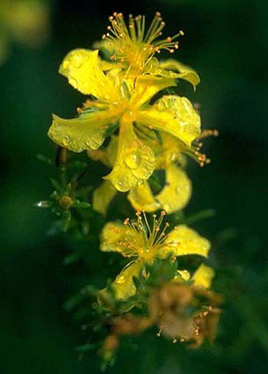Depression
 St. John’s wort has a long history of folk use for treating depression and modern science has shown it to be accurate.
St. John’s wort has a long history of folk use for treating depression and modern science has shown it to be accurate.
Clinical studies show that treatment with just one of the active compounds in this herb, hypericin, results in significant improvement in anxiety, depression and feelings of worthlessness.
Some studies show that it’s a more powerful antidepressant than some pharmaceutical drugs such as amitriptyline (Elavil) and imiprimine (Tofranil), Zoloft®, and Fluoxetine. It also has fewer side effects.
St. John’s Wort has also been shown to improve sleep quality, often a major problem for people who are depressed. In a German study, researchers gave St. John’s Wort to 105 people with moderate depression. Compared with a similar group that did not receive the herb, they slept better and showed less sadness, helplessness, hopelessness, exhaustion and headache. They also reported no side effects.
In another German study conducted in 1984, women who were depressed were given a tincture of St. John’s Wort. Their symptoms included anxiety, anorexia, lack of interest in life and psychomotor problems. All changed for the better. They even had fewer feelings of being worthless.
Research on St. John’s Wort was also conducted in Russia. The herb was combined with psychotherapy to treat alcoholics suffering from depression. One of the major advantages of St. John’s Wort is that, unlike many antidepressant drugs, it doesn’t impair your attention, concentration or your reaction time.
Trial studies have also shown that St. John’s wort extract may be more effective than Fluoxetine in Major Depressive Disorder (MDD).
A person may be diagnosed with MDD if 5 of the following 9 symptoms are present for 2 or more consecutive weeks, for most of each day, every day:
- depressed mood in adults or irritable mood in children and adolescents
- significant reduction in level of interest or pleasure in most or all activities
- loss or gain of weight when not dieting; insomnia (difficulty falling or staying asleep) or hypersomnia (sleeping more than usual)
- behavior that is agitated or slowed down
- decreased energy or fatigue
- thoughts of worthlessness or extreme guilt
- reduced ability to think, concentrate or make decisions
- thoughts of death or suicide.
One of the symptoms must be either depressed mood or loss of interest.
In a recent study funded by a grant from Lichtwer Pharma AG, 135 volunteers (57% women, 43% men with an average age of 37.3 – plus or minus 11 years) with MDD were randomized to receive 300 mg St John’s Wort extract three times daily and one placebo, or one 20 mg fluoxetine per day and three placebo. Medication and placebo were administered using a double-dummy technique so that each group received 4 tablets/capsules per day.
This clinical trial adds to the growing body of evidence that specific St. John’s wort extracts are at least as effective, if not more effective, than conventional antidepressant medication for the treatment of MDD.
St. John’s Wort is used primarily for treatment of depression. Over 30 clinical trials have studied its safety and efficacy for clinical depression. Most determined that it is superior to placebo and has a safety profile superior to pharmaceutical antidepressants.
More about St. John’s Wort…
Further, improving your health nutritionally can result in having fewer feelings of hopelessness and separation and allow you to gain a greater sense of belonging and unity. Stress melts away and you’ll feel light, clear, easy, and content.
Foods that help depression are brown rice, cucumbers, apples, cabbage, fresh wheat germ, and apple cider vinegar. Including one in each meal is adequate. For more information about nutrition and your mental state, click here…
